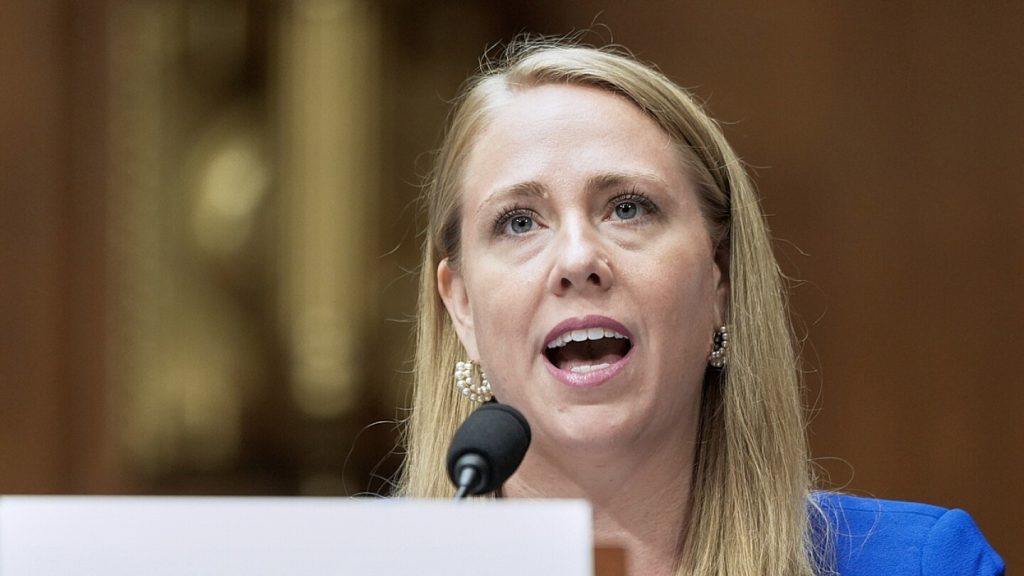Listen to the article
President Donald Trump has appointed Andrea Lucas as chair of the U.S. Equal Employment Opportunity Commission (EEOC), the nation’s premier workplace civil rights enforcement agency. The announcement Thursday confirms Trump’s support for Lucas’s conservative approach to civil rights enforcement, which has included limiting diversity programs, reducing protections for transgender workers, and prioritizing religious rights in workplace settings.
Lucas, initially nominated to the EEOC during Trump’s first term in 2020, secured a second five-year term in July despite significant opposition from Democratic lawmakers and civil rights organizations. Critics have accused her of politicizing the agency and undermining worker protections, while Republican supporters have praised her efforts to roll back Biden-era guidance on workplace gender identity protections.
“I’m honored to be designated Chair of the EEOC,” Lucas said in a statement Thursday. “Under the Trump Administration, the Commission has made significant progress advancing its core mission to uphold our nation’s civil rights laws and protect American workers through consistent, effective enforcement.”
The appointment represents a continuation of the significant restructuring of the agency that began in January, when Trump elevated Lucas to acting chair and took the unprecedented step of removing two Democratic commissioners. This maneuver, coupled with last month’s Senate confirmation of Trump nominee Brittany Panuccio as a commissioner, has established a Republican majority at the EEOC, enabling a deeper overhaul of civil rights enforcement policies.
Under Lucas’s leadership, the EEOC has shifted its focus considerably, taking on several religious discrimination cases, including a charge against Mayo Clinic alleging the hospital refused a security guard’s religious accommodation request regarding COVID-19 vaccination requirements.
Simultaneously, the agency has withdrawn from lawsuits supporting transgender workers and implemented heightened scrutiny for complaints related to gender identity. The commission has also ceased investigating complaints based on “disparate impact liability,” a fundamental concept in civil rights law designed to identify employment practices that disadvantage specific demographic groups, even when not explicitly discriminatory.
The agency has become a key instrument in the Trump administration’s broader efforts to challenge diversity, equity, and inclusion (DEI) initiatives in private institutions. However, employment attorney Scott Kelly of Ogletree Deakins notes that while specific implementation must comply with civil rights laws, DEI programming itself is not inherently unlawful. “The devil would be in the details there,” Kelly explained. “I like to remind my clients that we need to lean into the law and look at what precedent is out there.”
The National Women’s Law Center, currently engaged in litigation against the EEOC over its handling of discrimination complaints from transgender workers, strongly criticized Lucas’s appointment. Lauren Khouri, the organization’s senior director of workplace equality, described Lucas as “a Trump loyalist dedicated to carrying out his radical crusade against programs that encourage diversity, equity and inclusion.”
“Lucas has a history of abandoning workers at every turn and leaving them without protection, including women workers, transgender and nonbinary workers, and workers of color,” Khouri added. “People across the country are struggling to make ends meet and find stability at work, and we will fight to ensure they’re able to work safely, free from harassment and discrimination.”
In contrast, conservative legal organizations have welcomed the appointment. Dan Lennington, vice president and deputy counsel of the Wisconsin Institute for Law & Liberty, called Lucas “a champion of equality and race-neutrality,” adding that “the EEOC will be pivotal in extinguishing race-conscious policies, like DEI, from the private sector.”
Lucas’s appointment signals the continuation of a significant shift in federal civil rights enforcement priorities under the Trump administration, with potentially far-reaching implications for workplace discrimination policies, diversity initiatives, and protections for various worker groups across the United States.
Fact Checker
Verify the accuracy of this article using The Disinformation Commission analysis and real-time sources.




14 Comments
While I respect the President’s authority, I’m concerned this appointment could politicize the EEOC and undermine its core mission of protecting worker rights.
The EEOC must remain independent and focused on preventing discrimination, not rolling back hard-fought civil rights protections.
While I respect the President’s prerogative to appoint EEOC leadership, I hope the new chair will uphold the agency’s core mission of preventing workplace discrimination.
The EEOC’s independence and integrity are essential. I’m concerned this appointment could undermine those principles.
This news is concerning. The EEOC chair should be a neutral arbiter, not someone with a track record of limiting diversity programs and worker protections.
I hope the new chair will put the agency’s mission first and ensure fair treatment for all workers, regardless of their background or identity.
This news raises concerns about the direction of the EEOC under a critic of diversity programs. I hope the new leadership will still uphold workplace civil rights protections for all workers.
Agreed, it’s important the EEOC maintains its impartial role in enforcing anti-discrimination laws, regardless of the political leanings of its leadership.
The EEOC plays a crucial role in protecting worker rights. I’m concerned this appointment signals a shift away from promoting diversity and inclusion in the workplace.
Hopefully the new chair will put the agency’s mission above partisan politics and ensure equal protections for all workers.
This is a concerning development. The EEOC must remain objective and focused on protecting worker rights, not pursuing a partisan agenda.
I agree, the EEOC should not be used as a tool to roll back hard-won civil rights protections in the workplace.
Prioritizing religious rights over workplace discrimination protections is troubling. The EEOC must balance competing interests fairly and impartially.
Absolutely, the agency’s duty is to uphold the law and ensure equal treatment, not to advance a particular ideological agenda.